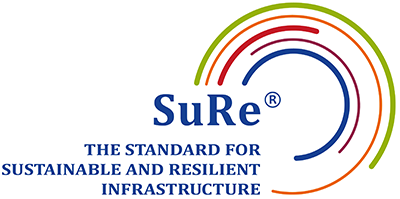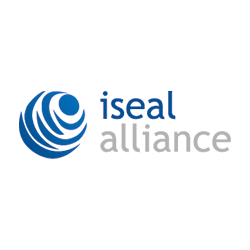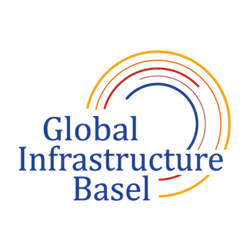About
About the SuRe® Standard
SuRe®– the Standard for Sustainable and Resilient Infrastructure is a third-party-verified, global voluntary standard, developed through a multi-stakeholder approach incorporating inputs from developed and emerging nations to drive the integration of sustainability and resilience aspects into infrastructure development and upgrade by providing guidance and serving as a globally applicable common language tool for infrastructure project developers, financiers and public sector institutions.
This chapter gives you following background:
NEWS
26 October 2021
26 October 2021
Learn about the positive impacts that SuRe® assessed projects have made, in this short impact summary of 5 selected infrastructure projects. Highlights include:
- saving of approximately US$ 36 million (75% reduction of the annual electricity bill) using renewable energy
- 47,454 tonnes of building material were recycled and reclaimed, accounting for a total cumulative value US$ 20.7 million
- $1bn USD economic benefits to surrounding communities
Objectives of SuRe®
SuRe® aims to: (1) establish a common understanding of sustainable and resilient infrastructure between project developers, financiers, public sector institutions and end-users (2) improve the quality of projects so they are built on sustainable and resilient principles and (3) help investors identify responsible investment opportunities. SuRe® has been developed by GIB and French investment bank Natixis with the support of stakeholders globally. The Standard integrates requirements for infrastructure projects to contribute at project level to the achievement of the objectives of international frameworks including the United Nations Framework Convention on Climate Change (UNFCCC), the Convention on Biological Diversity (CBD), the Sendai Framework for Disaster Risk Reduction, the International Labour Organisation (ILO) Declaration on Fundamental Principles and Rights at Work and others. SuRe® complements the Equator Principles and integrates the International Finance Corporation (IFC) Performance Standards on Environmental and Social Sustainability.
Which projects can apply?
The applicability of SuRe® includes (but is not limited to) the following types of infrastructure services:
- Water (harvesting, storage, management, distribution, treatment and recycling);
- Energy (generation, storage and distribution);
- Solid waste (collection, distribution, processing, recycling and storage);
- Transport networks, nodes and fleet (pedestrian, bicycle, vehicular, rail, water-borne and air transportation);
- Communication networks (telephone, cellular and data);
- Social infrastructure (education, healthcare, sports and recreation, law enforcement, fire and emergency services):
- Food systems (production, storage, processing and distribution);
- Mining and extractive sites.
A Project wishing to be SuRe® certified may apply for and retain SuRe® certification in any of the following development phases:
- Planning and design;
- Construction;
- Commissioning;
- Operation;
- Upgrade, augmentation and/or
Videos
SuRe® Standard for Sustainable and Resilient Infrastructure in English
Stakeholder Testimonies on Sustainable and Resilience Infrastructure Standards
The Business Case for International Standards for Sustainable Infrastructure
Perspectives of stakeholders on sustainable and Resilient Infrastructure Standards
Benefits of SuRe® Certification
For Project Developers
A SuRe® Certification is a gateway to international best practice for Sustainability and Resilience. With a SuRe® certificate, Infrastructure projects can boost the sustainability and resilience factors of their project by:
- Assessing the state of infrastructure project against international criteria;
- Identifying areas of improvement to bring projects to meet international sustainability standards;
- Demonstrating credibility and transparency to stakeholders;
- Attracting new financing opportunities and public support;
- Increasing international exposure;
- Contributing to the international policy agenda on climate change mitigation
- Ensuring mutual recognition with other standards.
For Investors
The SuRe® Certification is the only global and most credible instrument for risk mitigation and benefits creation within infrastructure development and is highly compatible with ESG safeguards, principles and standards used in project finance. The SuRe® Standard ensures:
- Lower default risk, through a better credit rating and lower borrowing rates
- Lower damage risk in disaster case, which results in a lower insurance premium
- Faster recovery of the Infrastructure after a disaster
- Higher infrastructure projects’ cash flows due to de-risking, sustainability and resilience
- Increased resource efficiency
- Better reputation of the brand equity.
For Public Offices
A SuRe® Certification stands for an overall increased quality of infrastructure projects which result in improving their resilience to climate change and society challenges and their ability to disaster risk reduction.
The SuRe® Standard:
- Facilitates the setting of appropriate procurement criteria
- Enables the comparison between infrastructure projects and thus facilitates the project selection
- Provides job creation, capacity building, and transfer of expertise and know-how for local communities
- Ensures effective governance, reliable operation, and economic efficiency in view of life-cycle cost, as well as safety and resilience against natural disaster, terrorism, and cyber-attack risks
- Supports the more efficient use of limited public resources in infrastructure.
SuRe® Around the World
SuRe® is globally applicable to infrastructure projects across different sectors and relies on independent verification and certification by third parties. We have assessed 175 projects using the SuRe® standard and its predecessor ratings, the GIB grading and the SuRe SmartScan.
Total Assessed Projects: 175 Projects, 47 Countries, USD 52bn CAPEX
SuRe® An Associate Member of Iseal
As of October 4th 2018 Global Infrastructure Basel Foundation (GIB) with SuRe® – the Standard for Sustainable and Resilient Infrastructure, has become the first infrastructure standard to be an associate member of ISEAL, the global association in defining and communicating what good practice looks like for sustainability standards.
The Swiss foundation Global Infrastructure Basel (GIB) started developing SuRe® – the Standard for sustainable and resilient infrastructure in 2014, with the main aim of promoting infrastructure that is sustainable and resilient, i.e. infrastructure that is environmentally sound, socially inclusive and economically viable, and can withstand impacts and recover quickly from shocks and stresses.
The development of the SuRe® Standard lasted three full years, and culminated with the release of the first certifiable version of SuRe®, version 1.0 at the COP23 in 2017.
To be eligible of joining the ISEAL members community, SuRe® had first to demonstrate its multi-stakeholder basis. During the development phase GIB conducted a stakeholder mapping in order to identify the main stakeholder groups for which the SuRe® Standard’s mandate is relevant, which are project developers, infrastructure financiers and public sector institutions. Representatives of the three main stakeholder groups, proportionally distributed in different continents, have joined the two governance bodies of the SuRe® Standard, i.e. the Standard Committee and the Stakeholder Council, where their inputs, comments and engagement are collected and taken into full consideration. Additionally, two public consultations about the SuRe® Standard were conducted, which received more than 200 comments from more than 10 different countries.
To become an associate member of ISEAL, SuRe® also went through an Independent Evaluation Procedure in order to demonstrate how the Standard’s procedures meet the baseline criteria for the three ISEAL Codes of Good Practice for Standard Setting, Assurance and Impacts. In complying to the baseline criteria, SuRe® demonstrates that GIB shares and contributes to the main ISEAL goals of improving the effectiveness and impacts of sustainability standards systems, and thus increasing their adoption at a global level.
With SuRe® GIB joins 24 other standard member organizations of ISEAL, such as e.g. the Forest Stewardship Council (FSC), Fairtrade International (FLO) and Assurance Services International (ASI).
As Associate Member SuRe® is on its way to continue the path towards full ISEAL membership by continuing the development of the SuRe® system through the Initial Implementation Phase of the Standard, running through 2018 – 2019. During this phase and beyond, SuRe® shall be applied to infrastructure projects in order to assess their compliance with the Standard.
About
Learn more
Certification
Learn more
Certified projects
Learn more
Governance
Learn more
Document Library
Learn more
FAQ
Learn more
Access E-Portal
Learn more


